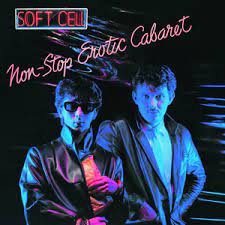Soft Cell is an iconic British synth-pop duo that formed in 1978 and became a mainstay of the 1980s music scene. Consisting of vocalist Marc Almond and instrumentalist David Ball, Soft Cell is best known for their chart-topping hit “Tainted Love,” as well as their innovative use of synthesizers and electronic production techniques. Let’s take a closer look at Soft Cell’s career to date and their lasting impact on the music industry.
Soft Cell first gained attention with their debut single “Memorabilia” in 1981, which showcased the duo’s unique blend of electronic music and soulful vocals. However, it was their cover of Gloria Jones’ “Tainted Love” that propelled them to international fame. The single became a massive hit in the UK and the US, topping the charts in both countries and selling millions of copies worldwide.
Soft Cell’s subsequent albums, “Non-Stop Erotic Cabaret” (1981), “The Art of Falling Apart” (1983), and “This Last Night in Sodom” (1984), were also successful, featuring hit singles like “Bedsitter,” “Say Hello, Wave Goodbye,” and “Soul Inside.” The band’s distinct sound, characterized by Almond’s rich baritone vocals and Ball’s innovative use of synthesizers, made them stand out in a crowded music landscape.
Despite their success, Soft Cell faced internal tensions and creative differences, leading to their decision to disband in 1984. Almond went on to pursue a successful solo career, while Ball focused on production work and collaborations with other musicians.
However, Soft Cell’s legacy lived on, and their influence could be heard in the work of countless artists across genres. In 2001, the duo reunited for a one-off performance at London’s Royal Albert Hall, which was followed by several other reunion shows in the years that followed.
In 2018, Soft Cell released a new album, “Happiness Not Included,” their first in nearly two decades. The album showcased the duo’s continued relevance and ability to craft innovative, catchy pop songs, while also exploring more mature and introspective themes.
Today, Soft Cell remains one of the most beloved and influential bands of the 1980s. Their innovative use of electronic production techniques and soulful vocals continue to inspire and influence musicians around the world. With a career spanning over four decades, Soft Cell’s legacy is firmly cemented in music history as a trailblazing duo that pushed the boundaries of what was possible in pop music.
Soft Cell’s collaboration with Pet Shop Boys on the single “Purple Zone” is a significant milestone in their career.
“Purple Zone” was released in September 2021, marking the first collaboration between the two iconic British synth-pop groups. The song features the signature sound of both bands, with Soft Cell’s Marc Almond delivering his distinctive vocals over Pet Shop Boys’ electronic beats and production.
The collaboration has been met with critical acclaim, with many praising the seamless integration of the two groups’ styles and the infectious energy of the song. “Purple Zone” has been hailed as a perfect blend of classic and contemporary synth-pop, showcasing Soft Cell’s continued relevance and influence on modern music.
With “Purple Zone,” Soft Cell proves that they are not content to rest on their laurels but are continually pushing the boundaries of electronic music. The collaboration with Pet Shop Boys is a testament to the enduring legacy of both bands and their continued relevance in the ever-changing music industry.
In conclusion, Soft Cell’s collaboration with Pet Shop Boys on “Purple Zone” is a significant addition to their already impressive career. It is a testament to their continued relevance and influence on modern music, as well as their willingness to experiment and push the boundaries of electronic pop. Soft Cell remains a legendary band that has left an indelible mark on music history and will continue to inspire and influence generations to come.
More Music News from New Music Times
-
New Single “FAKE” by Babette: A Fight for Authenticity in a Fake World
-
Springfield’s Metal Star ‘Archangel Royal’ Signs with Bentley Records and Drops New Single ‘Season of The VVitch’
-
When Faith Meets Hardship: ‘We Need a Win’ by Joy Boy
-
Young Love Revisited in Brandon C.W. Johnson’s ‘Back to Seventeen’
-
Hello Anthem’ by Angelcreatives: A Melodic Greeting for All


